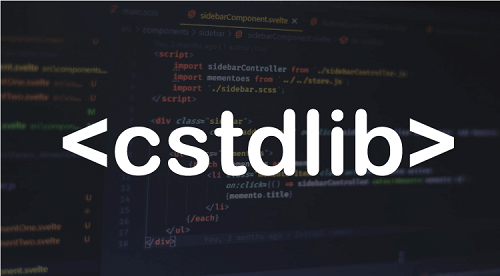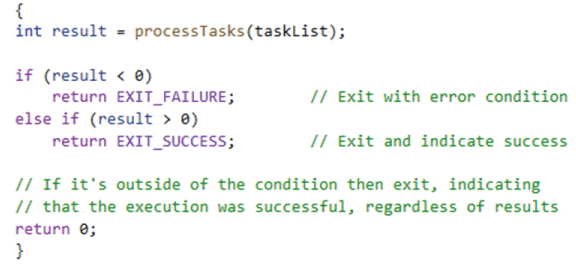cstdlib in C++In C++, what is cstdlib?
The C++ Standard Library header file (cstdlib in C++) is the header that contains one of the language's most extensively used libraries. This header specifies a set of methods and macros to help teams and technologies write efficient, high-performing, standardised C++ code. 
C++ is a widely used programming language, and among the primary reasons for its success was compatible with C, which was and still is a famous and very well language at the time. This flexibility not only made it simpler for coders to adapt, but it also allowed C++ developers to take advantage of pre-existing C code. Rather than starting from scratch, coders were capable of reused mature code blocks throughout a relatively quick move to C++. They were able to utilise the C Standard library header, stdlib.h, in particular. Nowadays, cstdlib in C++ is an improved C++ version of the initial <stdlib.h>. cstdlib vs stdlib.hThe C Standard Library Header, <stdlib.h>, provides dependable and effective operations for dynamic allocation of memory, datatype converting, pseudo-random number generating, process control, searching and sorting, math, and multibyte or wide characters to C programmers. Aside from these simple techniques, there are often used constants to improve code consistency across industries and technologies. Namespaces and HeadersThe original C++ specification, C++98, specified that utilising a <c -name-> header was the proper way to use functions inherited from the C library. In a standard C language, for example, one may use "string.h," whereas a similar project in C++ would include <cstring>. In addition, with the introduction of namespaces, newly written C++ library functions were no longer to be declared in the global, undefined namespace. They would instead be defined only in the standard namespace, std. In the long - term, using cstdlib for C++ indicates that all of the code in <stdlib.h> is declared in the std namespace. As a result, when programmers desire to utilize Standard Library functions, they must be qualified. This can be done explicitly or through the using directive, as shown below: 
Figure 1 illustrates the use of std::shared_ptr being used as component of a doubly linked list. The undefined usage of shared ptr<> in the left column results in an error since the statement does not belong to the global namespace. The namespace is clearly specified in the middle column, indicating to where the compiler may locate it. The using namespace std command in the rightmost column instructs the compiler to look in std for procedures that do not present in the local or global domains. It should be emphasised that the third (rightmost) alternative is regarded as unethical. Another way not mentioned before is to use the std::shared_ptr directive to add merely shared_ptr. Extra featuresThe C++ library's cstdlib provides a subset of classic C functions, macros, and datatypes. The declared set of absolute value (abs) functions is an instance of this. C specifies the procedures necessary for determining the absolute values (abs) of an integer, long, or long long value in stdlib.h. There's really, though, no way of knowing the absolute value of a float, double, or long double. These types are instead declared in math.h, another commonly utilized C header.
Figure 2: C Standard Library absolute value functions All of the following instances are covered by the corresponding abs() overrides in the C++ header's cstdlib. What exactly is included?C++ header cstdlib contains various member functions, datatypes, and constant values. The functions defined by the header file are described in the tables below. Conversion functions
The functions listed below become more reliable approaches to those listed above.
Functions relating to random numbers
Dynamic memory allocation functions
Searching and sorting functions
Mathematical functions
Perform with multibyte and wide characters with these functions.
Macros and ConstantsThe C++ library's cstdlib contains a number of macros and constants that aid in the standardisation of C++ development and code bases. As an instance, consider the constant values returned by the main function: EXIT_SUCCESS The EXIT_SUCCESS constant is capable of serving as the main function return value that the requesting framework interprets as successful execution. Even though the number zero also indicates a perfect program execution, EXIT_SUCCESS is implementation-specific. EXIT_FAILURE The EXIT_FAILURE constant also serves as the main function's return value. It does, however, convey to the caller framework that the implementation failed, maybe due to a major operating-system fault. 
NULL, which specifies a null pointer constant, RAND MAX, which corresponds to the highest allowable value generated by the rand command, and MB CUR MAX, which is the maximum amount of bytes in a multibyte character for the current locale are other instances of constant values defined by cstdlib in C++. ConclusionThe header of the C++ general-purpose standard library, abbreviated as cstdlib in C++, provides a basic collection of operations used for data type conversion, pseudo-random number generating, memory allocation, searching, sorting, mathematics, and dealing with wide or multibyte characters. It also includes several handy macros in the type of fixed values. C++ coders frequently utilise types, methods, or constants from cstdlib without needing to include this header because it is included by other headers they can use. Not knowing where particular types and utilities come from can lead to problematic compilation errors later on, when an earlier included header is removed and an observable is shockingly not recognised. Understanding that cstlib may be necessary helps minimize time in such situations. |
 For Videos Join Our Youtube Channel: Join Now
For Videos Join Our Youtube Channel: Join Now
Feedback
- Send your Feedback to [email protected]
Help Others, Please Share










